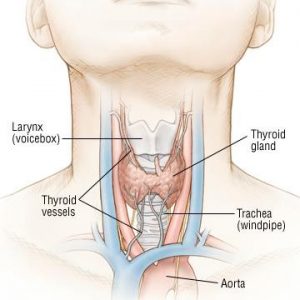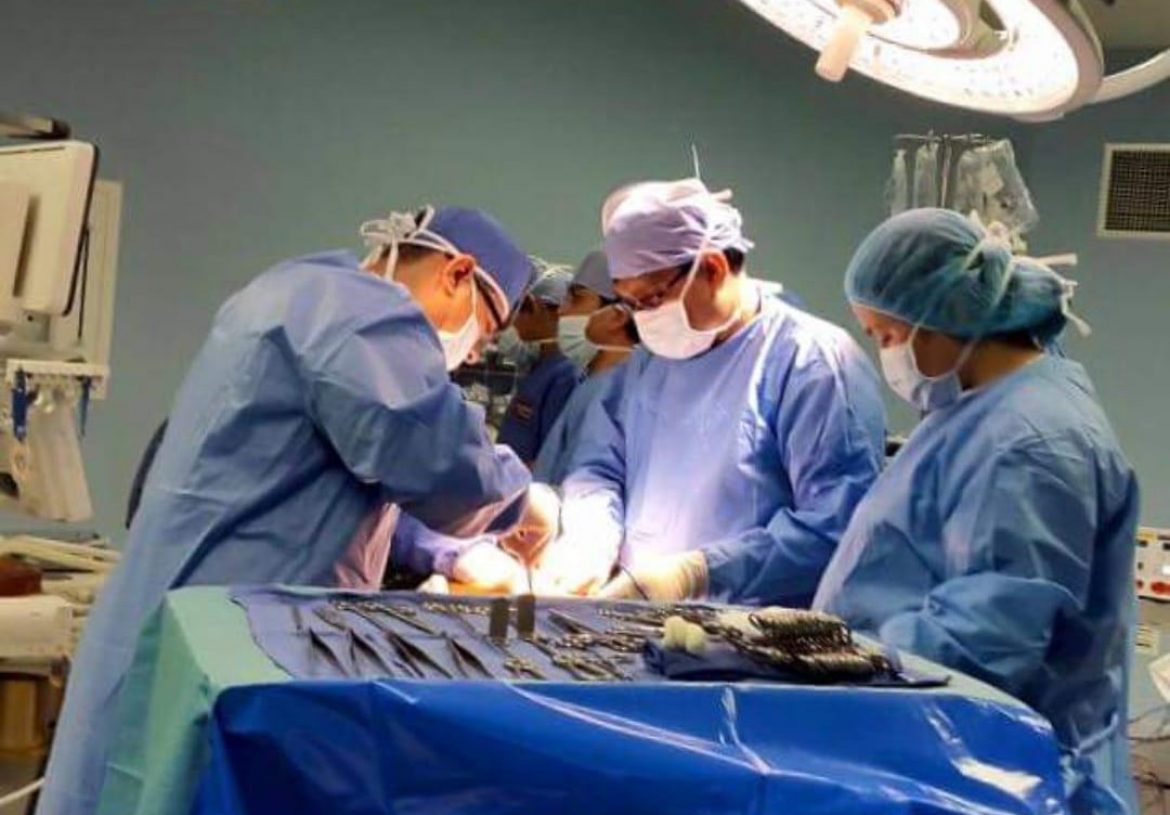FAQ created by Prof. Dr. Iyad Hassan (M.D, FACS, FRCS)
General and Endocrine Surgeon/ Head of General, Endocrine and Cancer Surgery Burjeel Hospital
What is Thyroid Gland?
 The thyroid is a butterfly-shaped gland that sits in your neck, draped across the windpipe and just under the larynx (voice box, adam’s apple.) It makes thyroid hormone, which controls your body’s metabolism, including weight, heart rate, temperature, and mental alertness. An enlarged thyroid is called a “goiter.” Most thyroids with a goiter or a lump still work properly, but some may be overactive.
The thyroid is a butterfly-shaped gland that sits in your neck, draped across the windpipe and just under the larynx (voice box, adam’s apple.) It makes thyroid hormone, which controls your body’s metabolism, including weight, heart rate, temperature, and mental alertness. An enlarged thyroid is called a “goiter.” Most thyroids with a goiter or a lump still work properly, but some may be overactive.
What are the symptoms of thyroid problems?
Each thyroid problem has its own symptoms. Here are common symptoms to look for with each condition:
Hyperthyroidism: Weight loss, rapid heartbeat, anxiety, fatigue, trouble sleeping, tremors and sweating.
Hypothyroidism: Thinning hair, weight gain, fatigue, muscle weakness, joint pain, depression and impaired memory.
Thyroid cancer: A lump on your neck, difficulty swallowing, swollen lymph nodes and changes in your voice.
Thyroid nodules: In many cases, nodules don’t produce symptoms. In other cases, nodules become large enough that you can see and/or feel them. Some nodules are cancerous, although most are benign.
What is thyroidectomy?
Thyroidectomy is the removal of all or part of your thyroid gland.
Thyroidectomy is used to treat thyroid disorders, such as cancer, noncancerous enlargement of the thyroid (goiter) and overactive thyroid (hyperthyroidism).
How much of your thyroid gland is removed during thyroidectomy depends on the reason for surgery.
Thyroid Lobectomy
- If only one lobe removed, your thyroid may be able to function normally after
Total Thyroidectomy
- If your entire thyroid is removed, you need daily treatment with thyroid hormone to replace your Thyroid’s natural
What are the risks of Thyroid Surgery?
Thyroidectomy is generally a safe procedure. But as with any surgery, thyroidectomy carries a risk of complications
- Vocal Cord Paralysis in lifetime 7% and in data for 3 – 18 weeks less than 2%
- Infection of Incision – Less than 1%
- Swelling and black/blue
- Keloid or overgrown scar
- Other organ damage
- Hypocalcemia -16%, on data 2%
- Haematoma or Bleeding – Less than 1%
- Seroma (fluid collection, swelling) – 5%
- Scar tethering/tightness – 5% early, usually settles with time
What are the standards PreOperative diagnostic needed?
Clinical Examination
Surgeon will inspect your neck to see any visible swelling or thyroid enlargement. He will palpate your neck from lateral and anterior aspect to assess the consistency and size of your thyroid and nodule by standing behind you.
He will ask you to swallow during palpation to assess the mobility of your gland and detect the nodules. He will also palpate the lymph nodes in your neck.
Ultrasound of Neck and Thyroid
Ultrasound will be done to assess the size of the nodules, suspicious malignancy features and calcification.
Blood Tests
Your blood tests particularly the thyroid functions test will be done.
FNAC (Fine Needle Aspiration Cytology)
The interventional radiologist will aspirate in LA(local Anaesthesia) few cells from the suspicious nodule with ultrasound guidance . Pathologist will give information if benign, still suspicious of cancer or true cancer.
PreOperative ENT Examination
To check the functionality of your vocal cord.
PreOperative Anaesthesia Assessment
Anaesthesiologist will review your medical condition and your past medical and surgical history, he or she will assess your airway and check fitness for anaesthesia for respective surgery.
Formality needed preoperatively
After visiting the Endocrine Surgery expert and if there is need for surgery for you and all investigations come normal.
Consent for agreement to surgery will be taken and approval form will be sent to the insurance. Surgery appointment will be fixed and the date will be informed through our OPD nurse at the day before surgery around 12-17pm via phone call.
How will you prepare for Thyroid Surgery?
When to stop eating and drinking?
You may need to avoid eating and drinking 8 hours before surgery. If you don’t, your surgery may be cancelled.
For morning surgery, Do Not Eat or Drink anything after midnight 12:00AM the night before surgery unless otherwise instructed.
For afternoon surgery, avoid eating 8 hours before surgery.
How to take medications?
If you are told to take your medicines on the day of surgery, take them with only a sip of water.
Other precautions
- Ask us if you are permitted to take your routine medications (such as those for heart, blood pressure, or insulin ) before arriving for surgery.
- Stop aspirin, warfarin, or any other blood thinner as discussed with the doctor prior to surgery
- Notify us there is a change in your condition prior to
What happens on the day of surgery?
Once You’ve Arrived In the Hospital
You will be directed to the Admission Desk at Ground Floor where you will tell your name and details, show your emirates ID, you will be asked all the details, they will verify and check your operation date which is scheduled, your admission will be done and you will be advised to shift in the designated room.
From Room to Pre-Operative Unit
When it’s time to change for surgery, you will get a hospital gown, cap, disposable underclothes to wear. Hospital staff will shift you from your room to Pre-Operative Unit for the surgery
Meet With Nurse in Pre-Operative Unit
You will meet with your nurse before surgery. You will be asked few questions regarding the last meal time and medications you took and other checklist. Tell your nurse the dose of any medications you took after midnight and the time you took them.
Meet With Anesthesiologist in Pre-Operative Unit
Your anesthesiologist will:
- Review your medical history with
- Ask you if you’ve had any problems with anesthesia in the past, including nausea or
- Ask you if you’ve had any drug allergy, smoking, and medications you
Preparation before the Surgery
From Preoperative Unit to Operation Room
Once your nurse and anesthesiologist have seen you, You will be taken in on a stretcher bed to the operation room by a member of operating room. He or She will help you onto the operating bed. Compression boots will be placed on your lower legs. These gently inflate and deflate to help blood flow in your legs.
Once you’re comfortable, The anesthesiologist or anesthetist will pass an intravenous (IV) line in any of your arm’s hand and injects a liquid medication into a vein and gives you an anesthetic medication as a gas — to breathe through a mask. A breathing tube will then be placed in your trachea to assist breathing throughout the procedure. The surgical team places several monitors on your body to help make sure that your heart rate, blood pressure and blood oxygen remain at safe levels throughout the procedure.
The Surgical Procedure
 Once you’re unconscious, the surgeon makes a small 3 to 5 cm incision in the center of your neck. All or part of the thyroid gland is then removed, depending on the reason for the surgery.
Once you’re unconscious, the surgeon makes a small 3 to 5 cm incision in the center of your neck. All or part of the thyroid gland is then removed, depending on the reason for the surgery.
If you’re having thyroidectomy as a result of thyroid cancer, the surgeon may also examine and remove lymph nodes around your thyroid depends on the type of surgery previously discussed. During operation surgeon will monitor and check functional integrity of your nerves ( Vagus Nerve and Recurrent Laryngeal Nerve) on Neuromonitoring Device. After removal of your thyroid/lobe surgeon will close your skin with sutures and apply the dressing. Thyroidectomy usually takes less than one hour, in some cases it may take one to two hour to be completed.
After the Surgery
From Operation Room to PACU (Post Anesthesia care Unit)
After surgery, you’re moved to PACU where the health care team monitors your recovery from the surgery and anesthesia. Once you’re fully conscious and stabilized, you’ll be moved to your hospital room.
You may have a drain in your neck under your incision but usually we do not insert a drain as in routine. In some cases with Hashimoto’s goitre leaving a cavity or patient under aspirin we may insert a drain to avoid collection of fluid. It’s usually removed the day after surgery.
After surgery, you may experience neck pain and a hoarse or weak voice. This doesn’t necessarily mean there’s permanent damage to the nerve (in rare cases 2-5%) that controls your vocal cords. These symptoms are often temporary and may be due to irritation from the breathing tube (endotracheal tube) that’s inserted into your windpipe (trachea) during surgery, or as a result of nerve irritation caused by the surgery.
You’ll be able to eat and drink after few hours of surgery. You may be able to go home next day of your surgery after staying one day in the hospital where you will be observed for any hematoma in neck at surgical site and for any sign of hypocalcemia viz: numbness and tingling sensation in your face, finger and toes, muscle cramps and spasm.
You will have wound dressing over the site of surgery. The wound dressing we use is waterproof you can take shower without any concern.
Thyroid hormone medication
If your whole thyroid was removed, you will be prescribed thyroid hormone tablets following surgery. You should take these on an empty stomach with water usually in the morning 30-40 mins before breakfast.. Milk, food, and other pills interfere with your stomach’s ability to absorb the thyroid hormone. 10 days after the date of discharge you will be called for the follow up in clinic. Stitched will be removed and you will have blood test to measure your levels of thyroid hormone and your dose of medication may be adjusted accordingly.
Calcium supplements
If you have parathyroid dysfunction or hypocalcemia after your surgery, you may also need to take calcium supplements. If you’re taking calcium, your doctor may also want you to take vitamin D to help your body absorb it.
When will you go home and what to avoid after surgery?
You may be able to go home next day, when you go home, you can usually return to your regular activities. Wait at least 10 days to two weeks before doing anything vigorous, such as heavy lifting or strenuous activities, sports and straining over neck.
Sick Leaves
You will be given sick leaves for 10 to 14 days which can be extended upon your need depends on your work environment.
At the day of discharge
Your wound dressing will be changed. You will be provided with discharge summary and discharge medication prescription which include “calcium and thyroid hormones as well as painkillers. Usually there is no need for antibiotic treatment as the Thyroid surgery is a clean surgery.
Appointment for follow up:
Appointment for the first follow up in OPD after 7 – 10 days will be given, you will come for removal of stitches and to review the histopathology, optimization of hormone and calcium treatment will also be given.
At the day of first follow up
- Stitched will be removed
- ENT postoperative concern for review of vocal cord
- Clinical review of organ system particularly the wound, if needed Ultrasound will be done to assess retained Anti scar cream will be prescribed.
- Blood test for calcium, PTH and Thyroid functions will be done to optimize the hormone
- Histopathology report will be discussion and possible referral to oncology department to plan further adjuvant
